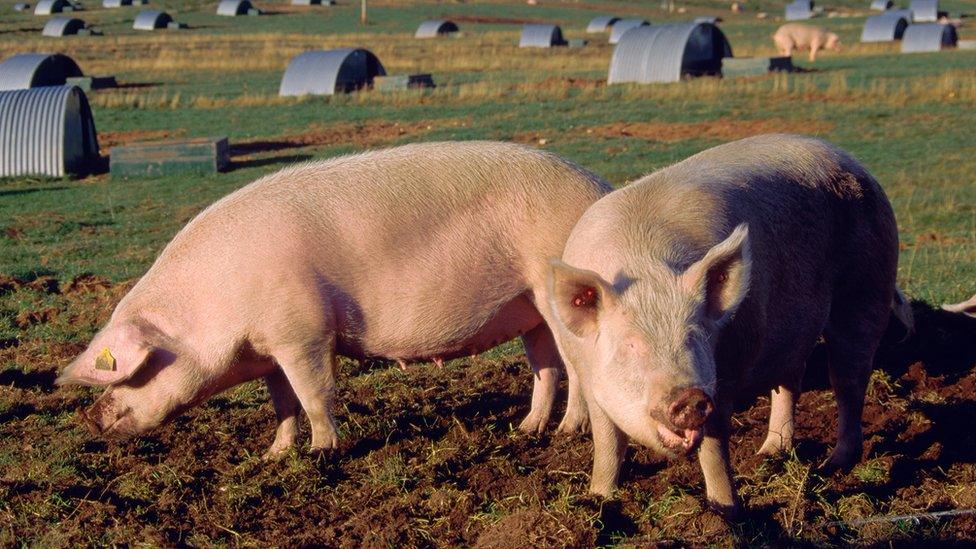Why some farmers are turning away from the Tories
- Published
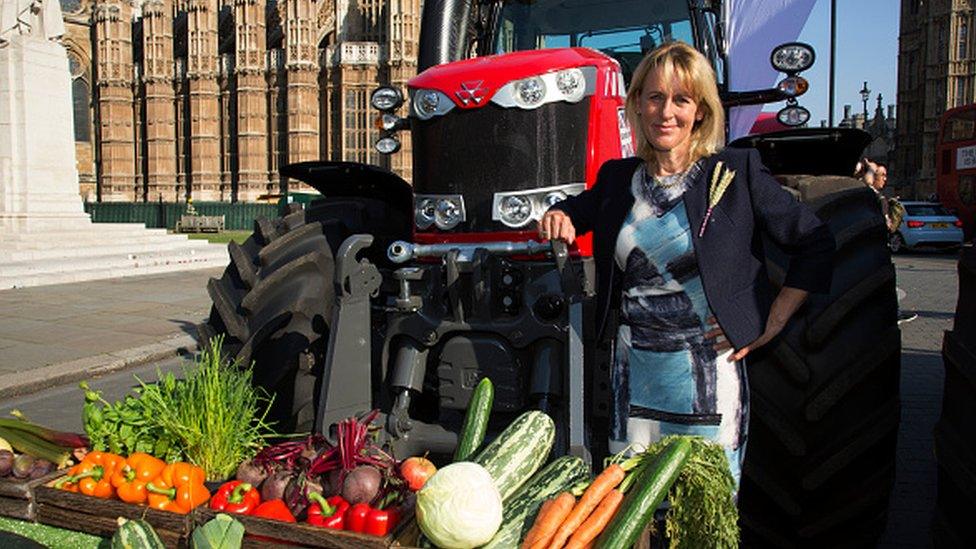
NFU President Minette Batters (pictured) has long been calling on MPs to back British farmers post-Brexit
Traditionally British farmers have been a solid support base for the Conservatives, but as they struggle with rising costs and policy changes, the mood is shifting in a way that could benefit the Liberal Democrats and shape the next general election.

As the Conservatives reeled from a shock by-election defeat in rural North Shropshire last year, their woes were magnified by one of farming's most influential voices.
"Farmers are voters too, and the Tories must stop ignoring us," National Farmers' Union (NFU) President Minette Batters wrote in the Daily Mail newspaper.
Her warning foreshadowed a poor set of results for the Tories in this month's local elections, with upsets in Somerset and Cumbria, where newly-formed councils went to the Liberal Democrats and Labour.
The results gave credence to polling showing a decline in Tory support among rural voters, external.
As the NFU president wrote, those voters include farmers, whose industry has been destabilised by economic shocks and bold post-Brexit reforms.
Is the government listening to them? Some farmers told the BBC they do not think so.
Contentious reforms
"Who do you trust?" asks James Small, a livestock farmer from Somerset.
He says he's "more Conservative" than anything else, but has become "very disillusioned" with the party's approach to agriculture.
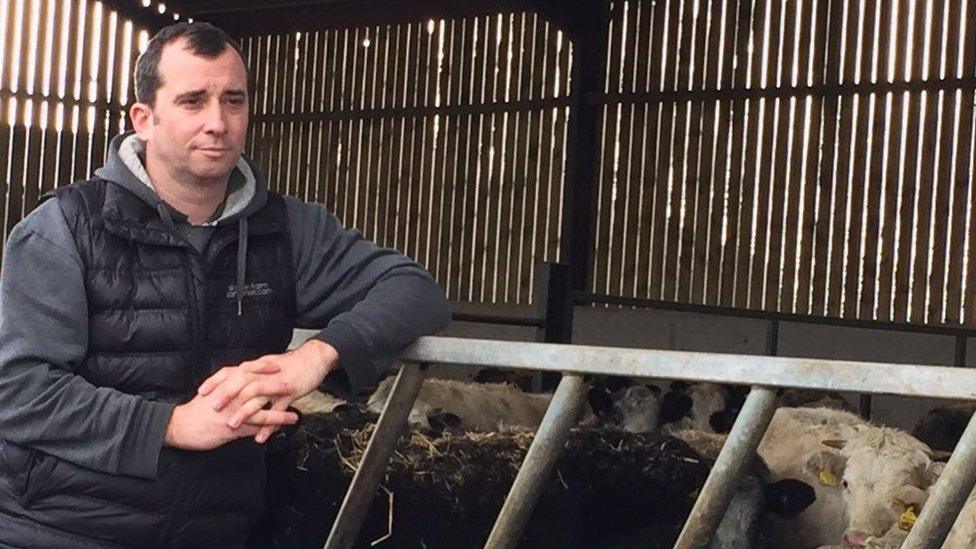
Livestock farmer James Small said he was frustrated with the government's farming policies
Voting in this month's local elections, Mr Small put his trust in the Liberal Democrats. They now run the council in Somerset, an area where Conservatives had been in charge since 2009.
Mr Small says the result probably reflects the "national mood" and the Conservative government's "strong agenda against the rural setting".
The government says it acts in the best interests of farmers like Mr Small, with sweeping reforms to farming following the UK's departure from the EU.
One of the most significant changes has been the phasing out of taxpayer-funded direct payments to farmers under an EU scheme.
In England, payments worth £2.4bn a year will be gradually cut until 2027, while new subsidy schemes linked to environmental objectives - rather than land use - are rolled out.
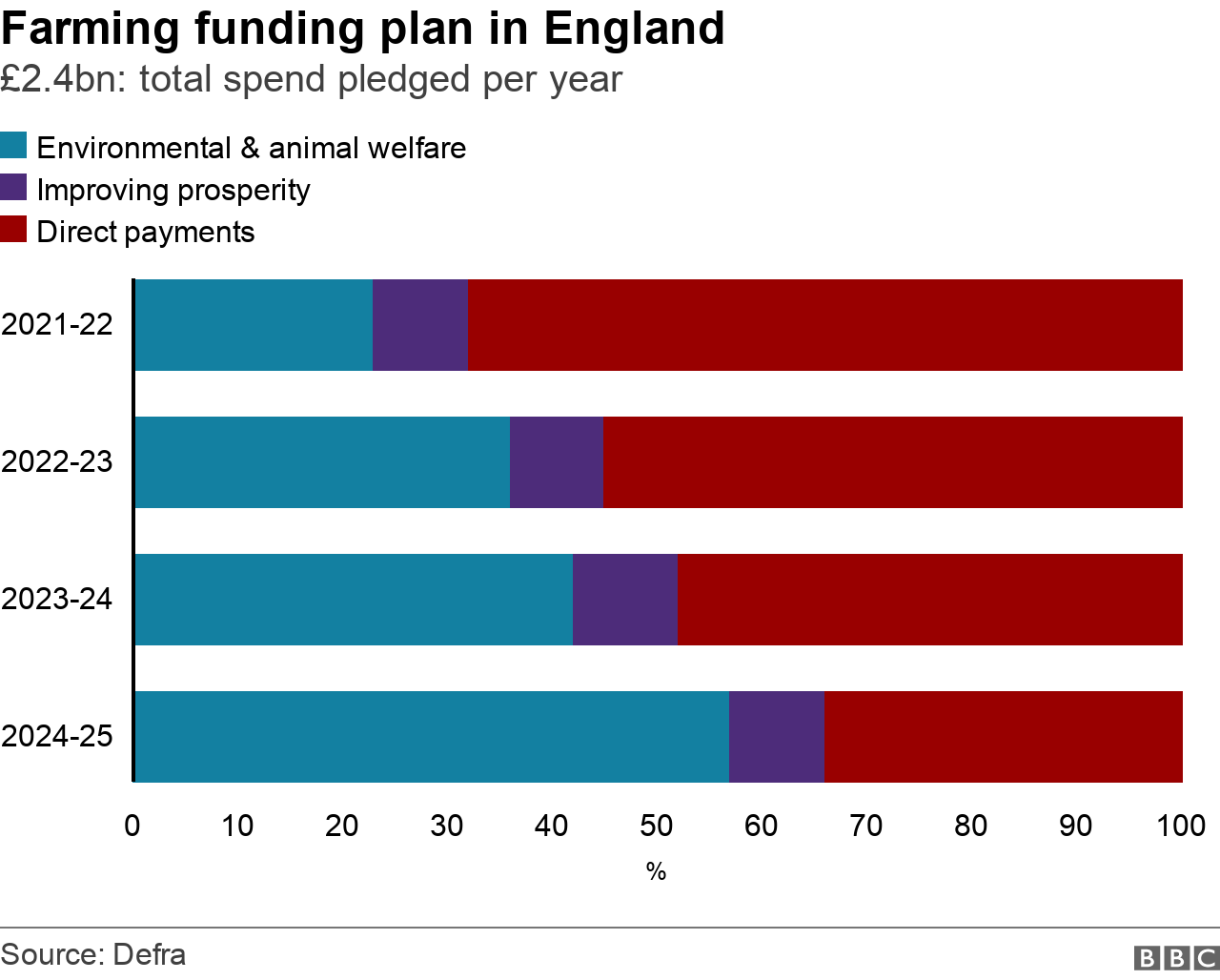

As the cuts take effect, Mr Small is considering reducing production to account for lost income.
While research shows many farms would not make a profit without EU subsidies, external, agriculture minister Victoria Prentis says it would not be right to abandon their phase-out, as they mostly benefit larger land owners.
"Whilst Labour and the Liberal Democrats don't want to address this inequality, we will," she says.
Mr Small says he is "not decrying" the subsidy cuts. "My problem is that we have a government saying we're going on a journey, but we have no idea what the destination is," he says.
He says the NFU president's scathing conference speech in February was a "good snapshot" of how farmers felt.
The NFU president said the government has "completely contradictory" policies on farming, adding that the government was "raising the bar for environmental standards at home but pursuing trade deals which support lower standards overseas".
She was particularly critical of the government's response to the turmoil crippling pig farming.
A disastrous few years has seen post-Brexit shortages of abattoir workers resulting in mass culls of healthy pigs and skyrocketing feed prices.
With an average loss of £58 per pig, the industry has lost over £500m since October 2020, according to the Agriculture and Horticulture Development Board (AHDB), external.
On Anna Longthorp's pig farm in East Yorkshire, she says "our cost of production is above where it's ever been before".
"It's been an absolutely awful time," adds Ms Longthorp, who rears free-range pigs near a village west of Hull.
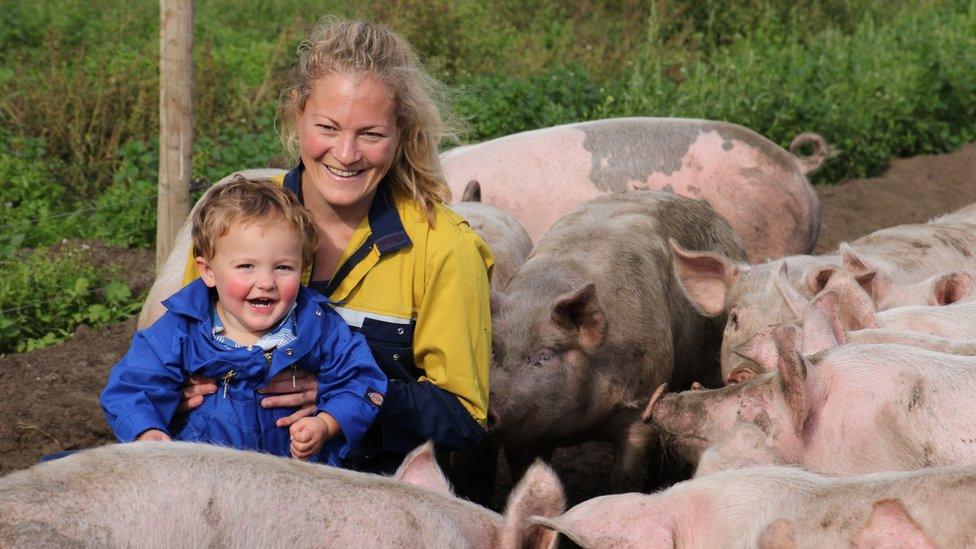
Anna Longthorp's family has been keeping pigs for generations in East Yorkshire
Farmers for four generations, the Longthorps have weathered their fair share of bad times.
"But colossal distress because of culling healthy pigs; farmers are never going to get over that," Ms Longthrop says.
"They're going to be haunted by that for the rest of their lives."
While the government has ordered a review looking at the fairness in supply chains, Ms Longthrop says the "solutions don't come fast enough".
"The whole supply chain is just utterly broken and we've been shouting and shouting for so long."
If there was a general election this year, "there's no way I could vote Tory", Ms Longthrop says. "Not a cat in hell's chance."
An electoral shift
The Liberal Democrats have already profited from Tory discontent, gaining 224 council seats in this month's local elections, many of them in rural areas.
These voters are "turning to the Liberal Democrats in their droves" because they know we "fight for our rural communities", says Tim Farron, the party's rural affairs spokesperson.
The party has high hopes for the upcoming by-election in the Devon constituency of former Tory MP Neil Parish, who resigned over watching porn in Parliament.
But "Tory support in rural areas is there", insists Angus Thompson, chairman of Chancellor Rishi Sunak's constituency association in North Yorkshire.
He says farmers and rural voters strongly believe in prudent management of public finances and that partly explains why the Conservatives gained control of a new council in North Yorkshire.
And he says Tory MPs need to back Boris Johnson and "keep the message that we are a party of 'sound finances' rather than the Liberals" who "spend money and worry about the consequences later".
Even so some voters had have already deserted the Tories, including Robert Craig, a dairy farmer from Cumbria.

For years he was president of the Conservative Association in Penrith and The Border, when former Tory MP Rory Stewart held the constituency.
But in 2019 Mr Craig resigned in solidarity with Mr Stewart, who was suspended from the Conservatives for rebelling against the government's Brexit agenda and subsequently stood down as an MP.
"I do not associate myself with the current Conservative administration at all, really," Mr Craig says. "I do question whether I was as Conservative as I thought I was."
Mr Craig did not even vote in the recent local elections, which Labour said were a "turning point" for the party.
In places like Cumbria, where Labour won a new council, farmers feel "betrayed" by the lack of support and voters have decided "the Tories are out of touch", says Labour's Jim McMahon, shadow secretary for the environment, food and rural affairs.
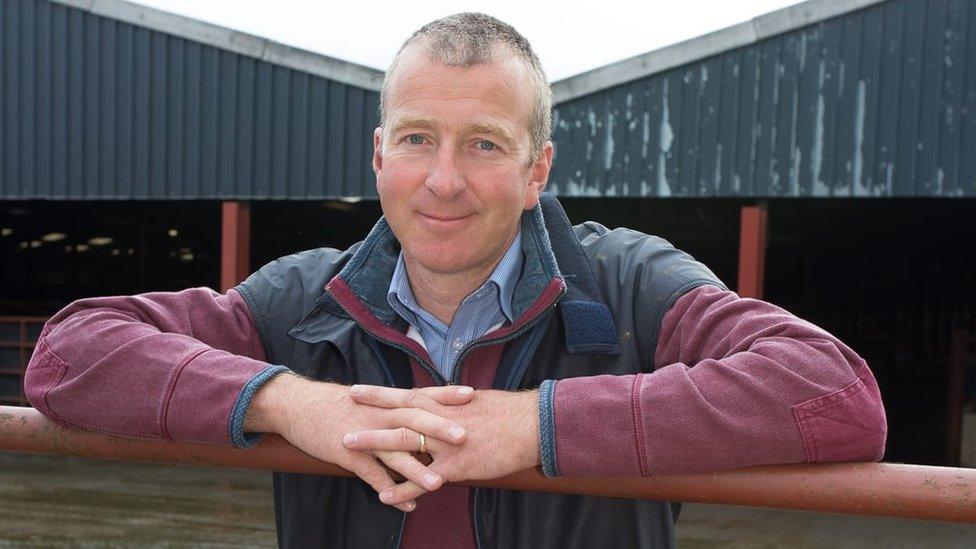
Dairy farmer Robert Craig used to be the president of his local Conservative association
Brexit was doing farmers like him "no good whatsoever", Mr Craig says.
He says labour shortages are the "biggest challenge" for his three dairy businesses.
Last year a committee of MPs, external said Brexit and the Covid-19 pandemic had left 500,000 job vacancies in the food and farming sector.
The government changed tack, extending a seasonal workers scheme and opening up more opportunities for skilled labour from abroad. And yet, vacancies remain unfilled.
"We're really struggling," Mr Craig says. "You advertise jobs and you get very little interest."
Plus, "we're seeing huge spikes" in energy and other production costs, he explains.
He welcomes government support to ease these growing costs, including an advance payment of subsidies to assist with cash flow.
Following Brexit, the transition to an independent agricultural policy has pushed farming up the political agenda.
In the debate, "a false choice" between food security and protecting the environment is sometimes presented, says Jonathan Roberts, director of external affairs at the Country Land and Business Association (CLA).
To keep farmers on board with its reforms, the government has to manage the process carefully and stimulate economic growth in the countryside, Mr Roberts says.
He says that for too long, the government's policies "have been geared towards treating the countryside as a museum" and now rural communities "are in a mood to say: I'm not going to vote in the way I always have".
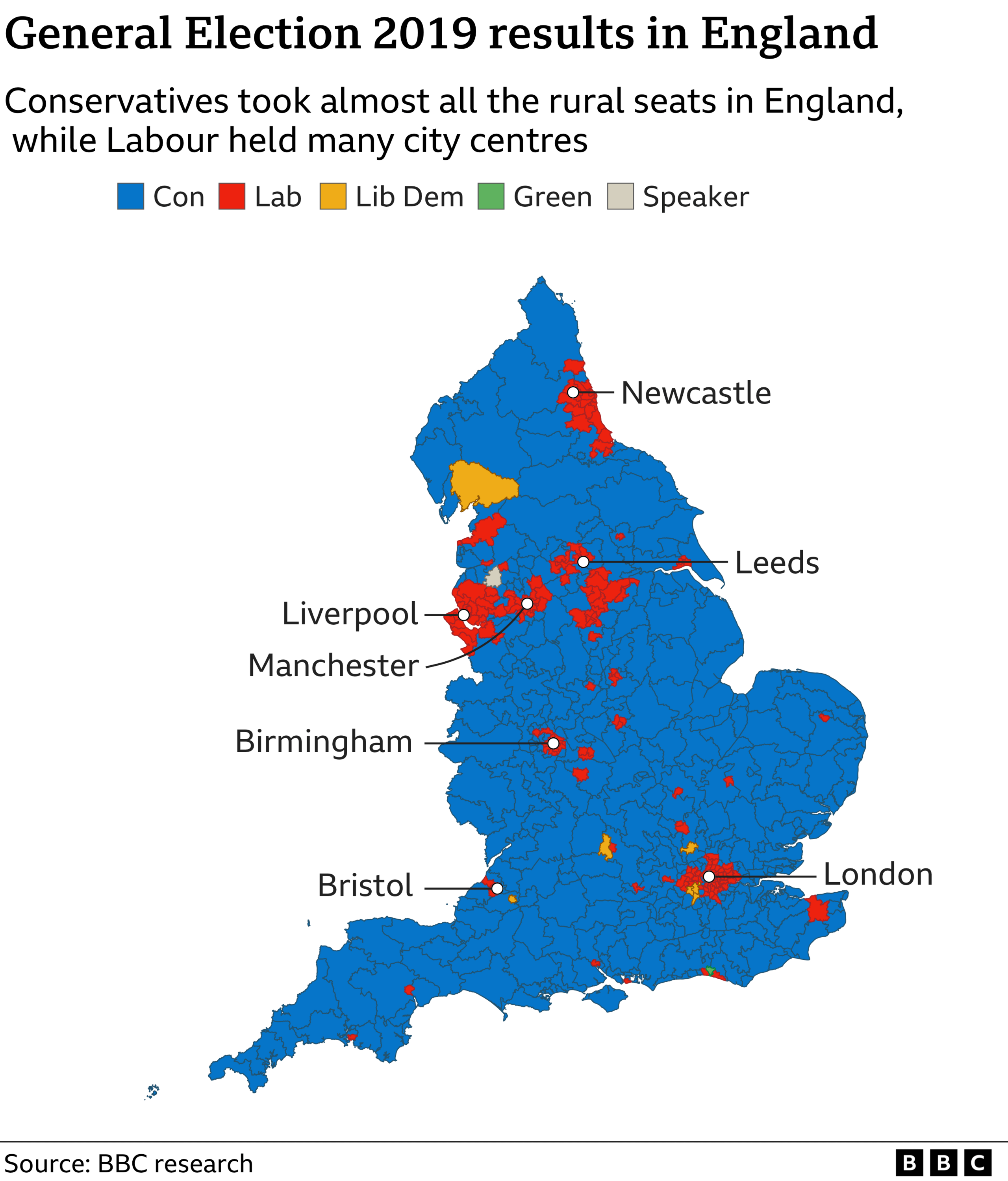

That mood has struck Ms Small, Ms Longthrop and Mr Craig, who have all turned their backs on the Tories, for now.
As the next general election looms, what would it take for them to vote Conservative again?
The Tories need to present a "coherent plan around food, energy and environment" for farming, Mr Small says. For Mr Craig, the party needs to ditch Boris Johnson and "incentivise people into a future of farming".
Both have bold demands, whereas Ms Longthrop has a more modest request, similar in tone to the NFU president's demands.
"Talking to farmers would be a good start," she says. "I need them to listen."
Related topics
- Published16 May 2022

- Published26 April 2022
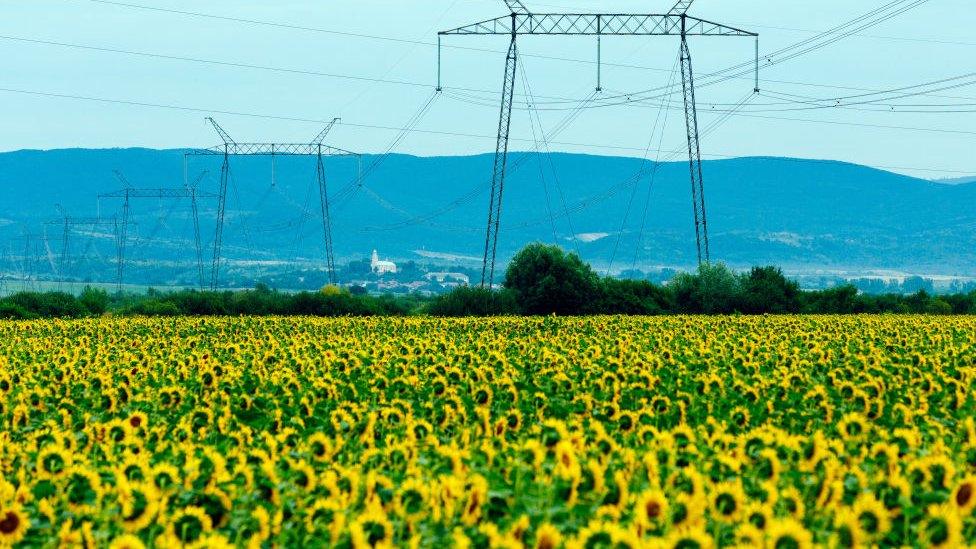
- Published9 April 2022
